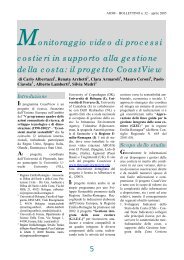The 21st Century climate challenge
The 21st Century climate challenge
The 21st Century climate challenge
Create successful ePaper yourself
Turn your PDF publications into a flip-book with our unique Google optimized e-Paper software.
his special contribution to this Report, we aredrifting into a situation of global adaptationapartheid.International cooperation on <strong>climate</strong> changedemands a twin-track approach. <strong>The</strong> priority isto mitigate the effects that we can control andto support adaptation to those that we cannot.Adaptation is partly about investment in the‘<strong>climate</strong>-proofing’ of basic infrastructure. Butit is also about enabling people to manage<strong>climate</strong>-related risks without suffering reversalsin human development.If left uncorrected the lack of attentionto adaptation will undermine prospects forhuman development for a large section of theworld’s most vulnerable people. Urgent actionon mitigation is vital because no amount ofadaptation planning, however well financedor well designed, will protect the world’spoor from business-as-usual <strong>climate</strong> change.By the same token, no amount of mitigationwill protect people from the <strong>climate</strong> changethat is already inevitable. In a best casescenario, mitigation will start to make adifference from around 2030 onwards, buttemperatures will increase to around 2050.Until then, adaptation is a ‘no-choice’ option.<strong>The</strong> bad news is that we are a very long wayfrom a best-case scenario because mitigationhas yet to take off.Special contributionWe do not need <strong>climate</strong> change apartheid in adaptation4Adapting to the inevitable: national action and international cooperationIn a world that is so divided by inequalities in wealth and opportunity,it is easy to forget that we are part of one human community.As we see the early impacts of <strong>climate</strong> change registering acrossthe world, each of us has to reflect on what it means to be part ofthat family.Perhaps the starting point is to refl ect on the inadequacy oflanguage. <strong>The</strong> word ‘adaptation’ has become part of the standard<strong>climate</strong> change vocabulary. But what does adaptation mean? <strong>The</strong>answer to that question is different things in different places.For most people in rich countries adaptation has so far beena relatively painfree process. Cushioned by heating and coolingsystems, they can adapt to extreme weather with the fl ick of athermostat. Confronted with the threat of fl oods, governmentscan protect the residents of London, Los Angeles and Tokyo withelaborate <strong>climate</strong> defence systems. In some countries, <strong>climate</strong>change has even brought benign effects, such as longer growingseasons for farmers.Now consider what adaptation means for the world’s poorestand most vulnerable people—the 2.6 billion living on lessthan US$2 a day. How does an impoverished woman farmer inMalawi adapt when more frequent droughts and less rainfall cutproduction? Perhaps by cutting already inadequate householdnutrition, or by taking her children out of school. How does a slumdweller living beneath plastic sheets and corrugated tin in a slumin Manila or Port-au-Prince adapt to the threat posed by moreintense cyclones? And how are people living in the great deltas ofthe Ganges and the Mekong supposed to adapt to the inundationof their homes and lands?Adaptation is becoming a euphemism for social injustice on aglobal scale. While the citizens of the rich world are protected fromharm, the poor, the vulnerable and the hungry are exposed to theharsh reality of <strong>climate</strong> change in their everyday lives. Put bluntly,the world’s poor are being harmed through a problem that is notof their making. <strong>The</strong> footprint of the Malawian farmer or the Haitianslum dweller barely registers in the Earth’s atmosphere.No community with a sense of justice, compassion or respectfor basic human rights should accept the current pattern of adaptation.Leaving the world’s poor to sink or swim with their own meagreresources in the face of the threat posed by <strong>climate</strong> change ismorally wrong. Unfortunately, as the Human Development Report2007/2008 powerfully demonstrates, this is precisely what is happening.We are drifting into a world of ‘adaptation apartheid’.Allowing that drift to continue would be short-sighted. Ofcourse, rich countries can use their vast financial and technologicalresources to protect themselves against <strong>climate</strong> change, at leastin the short-term—that is one of the privileges of wealth. But as<strong>climate</strong> change destroys livelihoods, displaces people and underminesentire social and economic systems, no country—howeverrich or powerful—will be immune to the consequences. In thelong-run, the problems of the poor will arrive at the doorstep ofthe wealthy, as the <strong>climate</strong> crisis gives way to despair, anger andcollective security threats.None of this has to happen. In the end the only solution to<strong>climate</strong> change is urgent mitigation. But we can—and must—worktogether to ensure that the <strong>climate</strong> change happening now does notthrow human development into reverse gear. That is why I call onthe leaders of the rich world to bring adaptation to <strong>climate</strong> changeto the heart of the international poverty agenda—and to do it now,before it is too late.Desmond TutuArchbishop Emeritus of Cape Town166 HUMAN DEVELOPMENT REPORT 2007/2008




